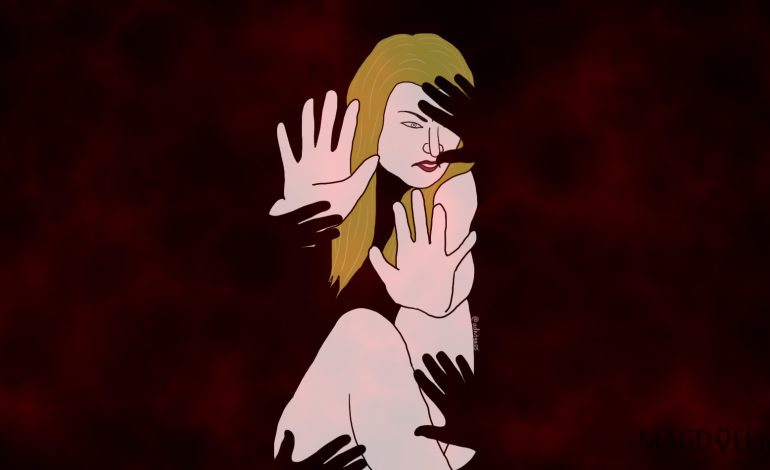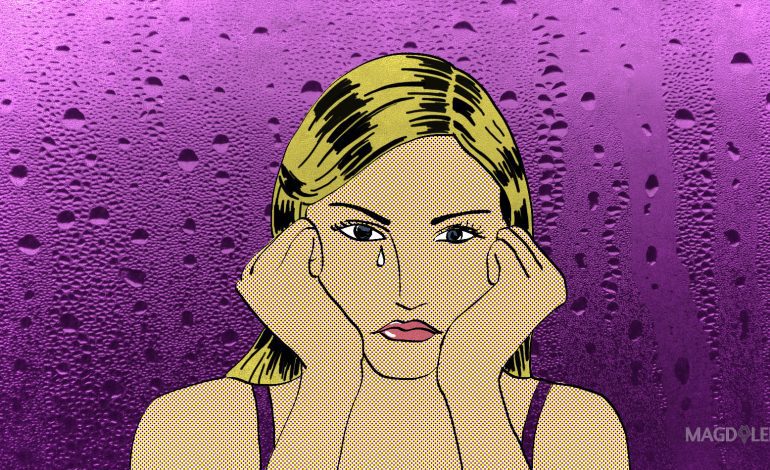Ending Rape Culture in Indonesia

When I was growing up there was a joke that used to go around. It’s about a man who robs a janda (an Indonesian word for a woman who is either widowed or divorced) at her house and rapes her.
Afterwards, as he is getting ready to leave her house, she counter threatens him: “Mau pulang atau mau ulang?” (You going to leave, or you going to do it again?)
Even in middle school I knew that there was something off about this joke. For one, it reflects the social attitude of the day, which saw widows and divorcees as morally loose, sex-crazed and husband-seducing women – a fair game. But I laughed along, assuming it must be one of those grown-up jokes that I had yet to “get”. Years later in college in the US, I often heard an expression that carries similar sentiment: “Can’t rape the willing.”
Only much later did I come to understand what was so wrong with that joke: rape is not funny. Rape is horrible. The joke is also a reflection of a society that normalizes sexual violence, equating it with some sort of sexual relation instead of an assault, and puts the blame on the victims. It is the reason why many rape victims do not come forward and why many rapists remain free and never punished.
I am a sexual violence survivor myself, and it took me years to finally realize that what happened to me was wrong and that it was not my fault. What I knew then was that to admit that I was being sexually molested almost every day would expose me, putting me in the same category as “fallen girls”. Because, as my mother’s response once to my sister’s complaint about the houseboys (the same ones who abused me at the time) being peeping Toms: “that’s just what boys do.”
So I kept my mouth shut and learned to sit with my legs always tightly closed when the houseboys were around. I also learned to lock my bedroom door, though this did not succeed in stopping the abuse. I grew up always cautious that I might send the wrong signals to boys and men, something that I subconsciously still do even to this day.
Since I opened up about my experience, many women have come forward to tell me that they, too, survived sexual violence, some so harrowing that I couldn’t help but cry as they recounted their stories to me directly or on email or text messages. One was repeatedly molested by her father, one by her brother when growing up, and yet another was raped by her neighbor. For some, I was the first person they had ever talked to about their rapes or abuses. The saddest thing is that for much of their lives they had lived with the assumption that they had done something wrong to induce the assault, often by people they trusted. And the scary part is that none of their rapists or abusers were ever punished, nor even reported.
The more stories I heard, the more it became clear to me that sexual violence is endemic in Indonesia. The statistics don’t lie: every two hours, three women become victims of sexual violence in the country, according to the National Commission on the Protection on Violence against Women (Komnas Perempuan). And this number is merely the tip of the iceberg.
The recent spate of brutal rape and murder cases of young girls have attracted widespread media attention, and pressures from women’s groups and activists have led the government and parliament to respond by drafting new legislations on sexual violence.
It has also prompted some soul searching over why the problem is so pervasive in the country. Questions were raised, though they hardly touch on the real cause of the problem, focusing on external factors such as alcohol and porn as the trigger of sexual crimes. Outside of circles of feminists and those with gender perspective, there seems to be very little discussion about the real cause of the high number of sex crimes: rape culture.
Why it’s a “culture”
Simply put, rape culture is an environment in which sexual violence is pervasive and normalized in the media, popular culture and society. It often exists, though not exclusively, in deeply patriarchal society in which gender dynamics is skewed, with women being subordinate to men, and in which there is a general lack of gender equality.
Rape culture is manifested in the way women are objectified in the media; in our daily social interaction, the way women are valued for their physical appearance; in our language, turning rape into humor, or euphemizing the word memperkosa (to rape) with words like menggagahi (to overpower) or menodai (to taint); in laws that do not take side with rape victims; in law enforcers’ lack of empathy for the victims and their apathy when handling rape cases, discouraging survivors from seeking justice; in a culture that stigmatizes sexual violence victims as defiled women; and in many other ways.
Sociologists believe that rape culture links non-consensual sex to the cultural fabrics of a deeply patriarchal society, leading to widespread social and institutional acceptance of rape.
Victim blaming is one of the most obvious sign of rape culture. Asking questions like what a woman wore when she was raped, or whether she had been drinking alcohol, or why she was alone at that time of day at that particular place is some of the most common ways of victim blaming.
Caregivers of sexual violence survivors in Indonesia are accustomed to hearing police, prosecutors or judges ask rape victims these questions. A few years ago, a woman who was sexually assaulted by four Transjakarta employees in a bus shelter in Central Jakarta was blatantly harassed during the trial by the panel of judges, who asked what color her bras were that day and why she wore knee-length pants when she’s a Muslim from the staunchly Islamic province of Aceh. In the end, the four men were only sentenced to 18 months in prison, further insult to their victim who has to live with physical and psychological trauma for the rest of her life.
Reactions and comments by high-ranking officials and top politicians reflect how the elites view rapes. A few years back, then Jakarta Governor Fauzi Bowo responded to the case of a gang rape of a woman in a minivan in South Jakarta, by saying that women should not wear miniskirts in public transportation to avoid “any unwanted consequences”.
A candidate for the Supreme Court Justice who was the chief of a High Court in South Kalimantan at the time quipped when asked his opinion about death penalty for rapists during an integrity test: “both the rapist and the victim enjoy it. So we have to rethink about the death sentence.”
Though they later clarify their remarks as a joke or having been taken out of context, they merely showed the true color of many decision makers in Indonesia, who see sexual violence as a problem that must be dealt with by women. Rape can only be prevented by women. Sociologists believe that rape culture links non-consensual sex to the cultural fabrics of a deeply patriarchal society, leading to widespread social and institutional acceptance of rape.
Across the region and cultures
A United Nations study conducted in 2013 found that society in South Asian countries tend to be permissive of sexual violence against women, and that rape is not considered a serious crime in much of the region.
The study surveyed 10,000 men in Bangladesh, Cambodia, China, Indonesia, Papua New Guinea and Sri Lanka, and a fourth of these men admitted to having committed rapes at some time in their lives. One in 10 had raped someone who was not their romantic partner. Men in Papua province in Indonesia came second at 40.6 percent, after Papua New Guinea-Bougainville (62.4 percent), followed by those in urban Indonesia (26.2 percent) and in rural Indonesia (19.5 percent).
Most importantly, what the study shows is that many of the men have no idea that rape means nonconsensual and forced sex. They also do not know that rape occurs within marriages too. The study found that rape between married partners was more prevalent than among people who were not in a romantic relationship.
The first step in addressing this social ill is acknowledging that Indonesia has a serious rape culture.
The survey also showed that repeat offenses are high among rapists, with nearly half of the respondents admitting to having raped multiple victims. Almost a fourth said they had raped two to three people.
The main drive behind this high prevalence of rapes is a sense of entitlement their gender gives them, which takes root from a young age. More than half of the respondents admitted to having raped someone when they were teenagers.
A total of 70 percent of the men said they did it because they had the right to claim women’s body, while 40 percent said they were angry or wanted to punish the women. Half of the men said they did not feel guilty and just 23 percent of the men said they had been imprisoned for their crimes.
The problem extends beyond the region and even in developed nations. In the United States, where rape culture thrives as well, an estimate of only three percent of the rapists end up serving jail time, according to the Rape, Abuse, and Incest National Network (RAINN).
Changing rape culture
The first step in addressing this social ill is acknowledging that Indonesia has a serious rape culture. It means admitting that we live in a society that favors silence, in which victims are less likely to report their assault for fear of being blamed or stigmatized.
We live in a society that causes a woman who was raped by her own neighbor, a prominent member of the community, to move out of her neighborhood to avoid public hostility against her. We live in a society in which people see nothing wrong with sharing on social media or messenger groups the post-mortem x-ray images of a brutally killed rape victim.
We live in a society in which a legislator blames a rape victim for walking alone from school, and politicians insist a bill on alcohol ban is more important than an anti-sexual violence bill. We live in a society in which the media often paint rapists in positive light (“a polite man who always performs the prayers”), while sexualizing female victims (“the woman’s body was found wearing red bras”).
We live in a society of compromise, in which girls are commonly forced by their parents to marry their rapists (and the media think it’s moving); and police recommends rape victims to settle their cases out of court in a “peaceful” way. And we live in a society ruled by rigid gender stereotypes, which depict men as violent-prone and sexually driven beings.
How do we change the rape culture?
The way we do other social problems, by targeting the real source of the problem, which is gender inequality. For one, the focus of any efforts to end sexual violence must be on the perpetrators, not the female victims or potential victims, reversing some of the gender dynamics that contribute to rape culture.
Prevention must include comprehensive sex education for children and adolescence that covers discussions on gender equality and healthy relationship. Education efforts must include everyone involved, including government officials, lawmakers, educators, parents, employers, religious leaders and, most importantly, law enforcers and the members of the justice system.
A stricter law like the regulation in lieu of law issued a couple of days ago is not a panacea to this problem. But accompanied with a better legal system, a comprehensive law will work more effectively as a deterrent factor, as well as a way to ensure support for sexual violence survivors.
These are some of the measures to start building a better and more just society, in which half of the population feels as safe as the other half.
Read Devi’s report on discriminative regional bylaws in Indonesia and follow @dasmaran on Twitter.
To continue the conversation and support the campaign against sexual violence, visit campaign.com/mulaibicara.






















